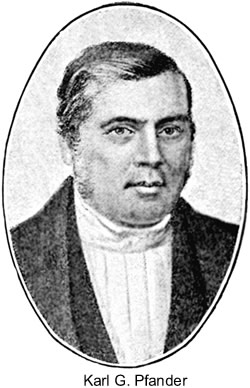Carl (ou Karl) G. Pfander (pasteur protestant)

(1805-1865)
Le Mizanu'l Haqq
L'équilibre de la Vérité
réfutation de l'Islam

en arabe => lire
en anglais => télécharger
la version
en
français et en ".doc" (traduction par Michel H.)
Nous recherchons un traducteur perse/français
pour établir la version française des citations du Coran
et des Hadiths
Table des Matières
3ème Partie Une enquête franche sur la revendication de l’Islam à être la révélation finale de Dieu.
Chapitre 1 Une explication de la raison et de la portée de l’enquête 222
Chapitre 2 Est-ce que la bible contient des prophéties concernant Mahomet ?227
Chapitre 3 langage et le style du Coran - preuve qu’il est la parole de Dieu ? 253
Chapitre 4 contenu du Coran, 268
Chapitre 5 les miracles allégués de Mahomet306
Chapitre 6 comportements de Mahomet et qualité de prophète 327
Chapitre 7 la manière dont l’Islam s’est répandu en Arabie et dans les pays voisins349
Chapitre 8 Conclusion
Carl [Karl] Gottlieb Pfander
Reference: Pfander, Carl [Karl] Gottlieb(1805-1865), The Mizanu'l Haqq: The Balance of Truth, Revised and enlarged by W. St. Clair Tisdall, The Religious Tract Society, London, England, 1910, pp. 370.
In his book entitled, The Muhammadan Controversy, Sir William Muir wrote the following on the works of Dr. Pfander.
We pass on to the consideration of Dr. Pfander's writings, which consist of three treatises: first, Mizan-ul-Haqq, or "Balance of Truth"; second, Miftah-ul-Asrar, or "Key of Mysteries"; and third, Tariq-ul-Hyat, or " Way of Salvation." They were originally written in Persian, but have also been published in Urdoo, excepting the last which is in progress of translation. From his residence and travels in Persia, Pfander possesses advantages which fortunately qualify him in an unusual degree for the great controversy with our Moslem population. He was attached for ten or twelve years to the German mission at Fort Shushy on the confines of Georgia, from whence he made frequent and protracted visits to Persia, penetrating as far as Bagdad, and returning by a circuitous tour through Isfahan and Teheran. In 1836, the Russian Government, unable to tolerate the presence of foreign ecclesiastics, put a stop to the mission, and thus proved the means of providing us with labourers who in the field of Persia had acquired so valuable a knowledge of its language and so intimate an acquaintance with the religion and tenets of the Mohammedans. Pfander joined the Indian mission of the C. M. S. in 1838.
Our author has not been backward in improving his peculiar privileges, or in availing himself of the help which the previous controversy and such writings as those of Dr. Lee afforded him. His first and most important work is the Mizan-ul-Haqq, or "Balance of Truth," as between Christians and Moslems; and being of extraordinary value, we shall endeavour to present our readers with a complete account of it. The original Persian edition was published at Shushy in 1835, and the Urdoo translation was lithographed at Mirzapore in 1843 ....1
Arabic, Greek, and Hebrew text: There are quotations in Arabic, Greek, and Hebrew text that use Unicode. It may be necessary to configure your web browser to visualize this text. The Muhammadanism web site has help files for Unicode. You can make sure that your web browser displays properly the Unicode Arabic characters by logging onto the Internet and clicking, Unicode.
The Table below indicates some of the changes that were made in the
text of the book. These changes were made to facilitate word searches
and to reflect the modern word spelling of the words. For example,
the modern spelling is Islam, whereas, the book has the spelling of Islâm.
So, the web version of the book uses the spelling, Islam, for the printed
book's spelling of, Islâm. Since most readers would do a search on
the word, Islam, rather than the word, Islâm, it was felt that it
would be better to substitute the unaccented letters for original's accented
letters.
Original
1 Sir William Muir, The Mohammedan Controversy, Biographies of Mohammed, Sprenger on Tradition, The Indian Liturgy, and the Psalter, T. & T. Clark, 38 George Street, Edinburgh, Scotland, 1897, pp. 20.
souce : http://www.muhammadanism.org/Pfander/Mizan/Default.htm, 4 février 2009.